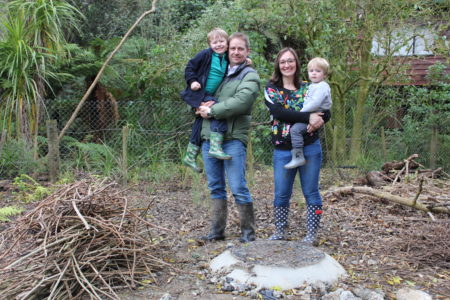
Smoke testing has begun in Cockle Bay in a bid to reduce wastewater overflows.
This comes after local residents’ cries for help to stop sewage flooding into their backyards.
The sewage overflows are caused by stormwater illegally entering and overwhelming the wastewater network during periods of high rain.
Now Watercare are enlisting the help of the community to identify and fix illegally connected downpipes and non-complaint gulley traps to reduce the amount of storm water entering the wastewater network.
The Nunn family are one of many families in the area whose backyards overflow with wastewater during bad weather.
“We have had sanitary items, toilet paper, faeces wash into our backyard before,” says Dalyn Nunn.
“Every time it rains we just watch the bottom of our backyard flood with dirty water.”
Craig and Dalyn’s property on Advene Road backs onto a stream that leads straight to the beach.
During extreme weather, they have had the manhole at the bottom of their property burst open and watched helplessly as sewage spills out onto the area where their children should be allowed to play.
“Ultimately this wastewater ends up in the stream, leading to our beaches,” Craig says.
Craig and Dalyn say they have battled for years with Auckland Council and Watercare to have something done about the waste water overflows.
Together with their neighbour Matthew Brajkovich and a few other residents, they have been working with Watercare to implement a solution.
“Watercare has acknowledged that no matter whose responsibility it is, this is a huge problem and they’ve put their hand up to help,” says Dalyn.
“It’s only one part of the solution, but it’s a start and it will make a difference for us,” says Craig.
While smoke testing has been used extensively throughout Auckland for some time, this is the first time Watercare has ever contacted the community prior to testing and actively encouraged residents to take some responsibility and address any faults before we get there.
“We’re trying to encourage Aucklanders to take some ownership for the problem. Watercare can do its part by building new infrastructure and maintain the network but individuals can also help by making sure their pipework is compliant,” a Watercare spokesperson says.
“Cockle Bay is an older area of Auckland. The area has undergone growth, with infilling. The wastewater network works well in normal conditions but during heavy rain, huge volumes of stormwater are illegally entering and overwhelming the system, creating overflows.”
The smoke testing involves Watercare using a smoke detection unit to blow non-toxic white smoke into the wastewater system to identify illegally connected downpipes and non-compliant gulley traps.
Those whose homes are found to have non compliant gulley traps and illegally connected downpipes will be required to fix the problem.
“Details will be sent to the compliance team at Auckland Council, who will follow up with residents. Details may be recorded on LIM reports,” a Watercare spokesperson says.
Watercare programme improvement manager, operations says: “People don’t realise the impact something as simple as an incorrectly connected pipe can have but the reality is that just stormwater from just one roof can displace the equivalent wastewater from more than 40 households.
“There are too many wet-weather overflows in Cockle Bay and the sooner we put an end to this problem, the better.”







